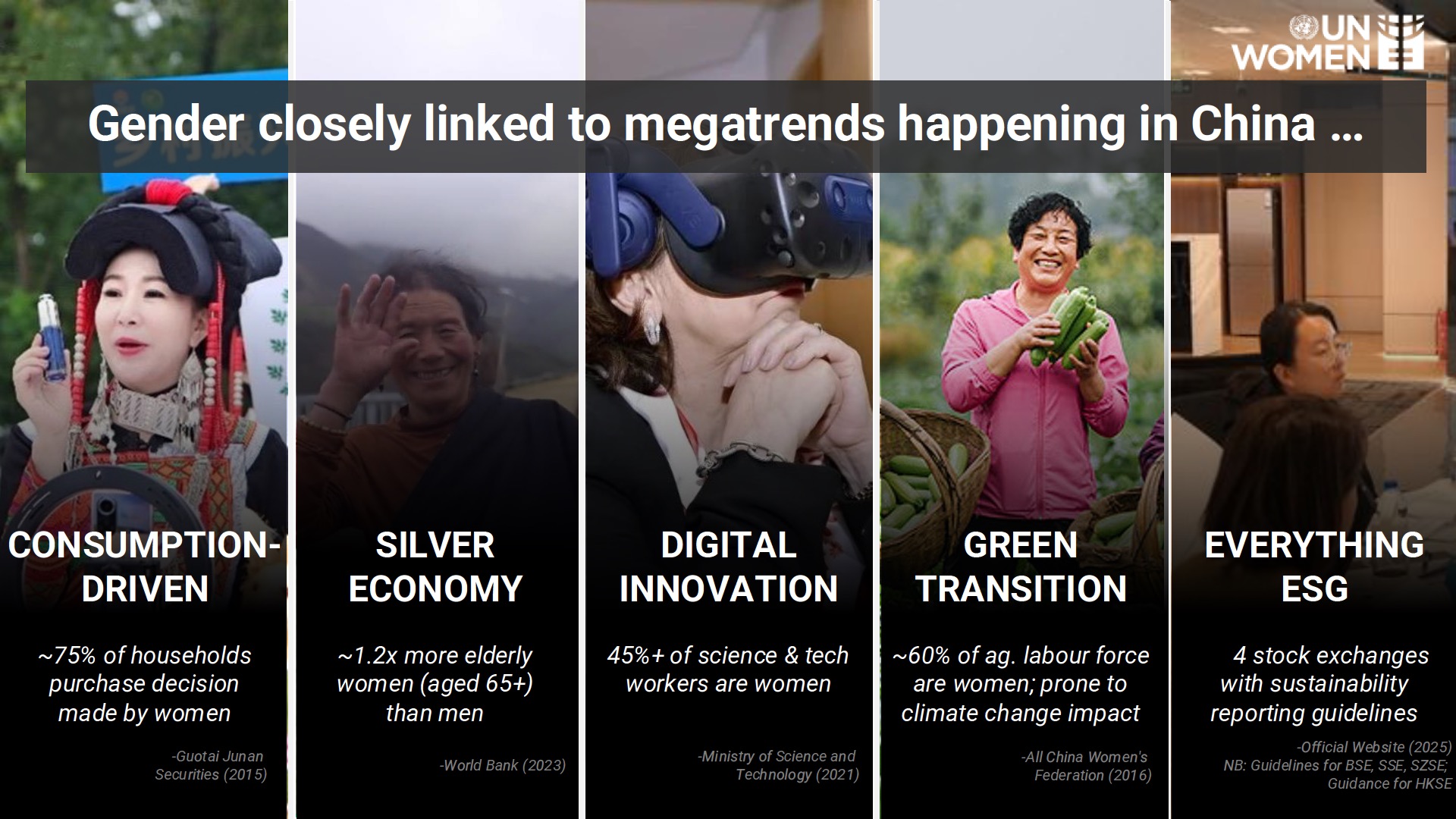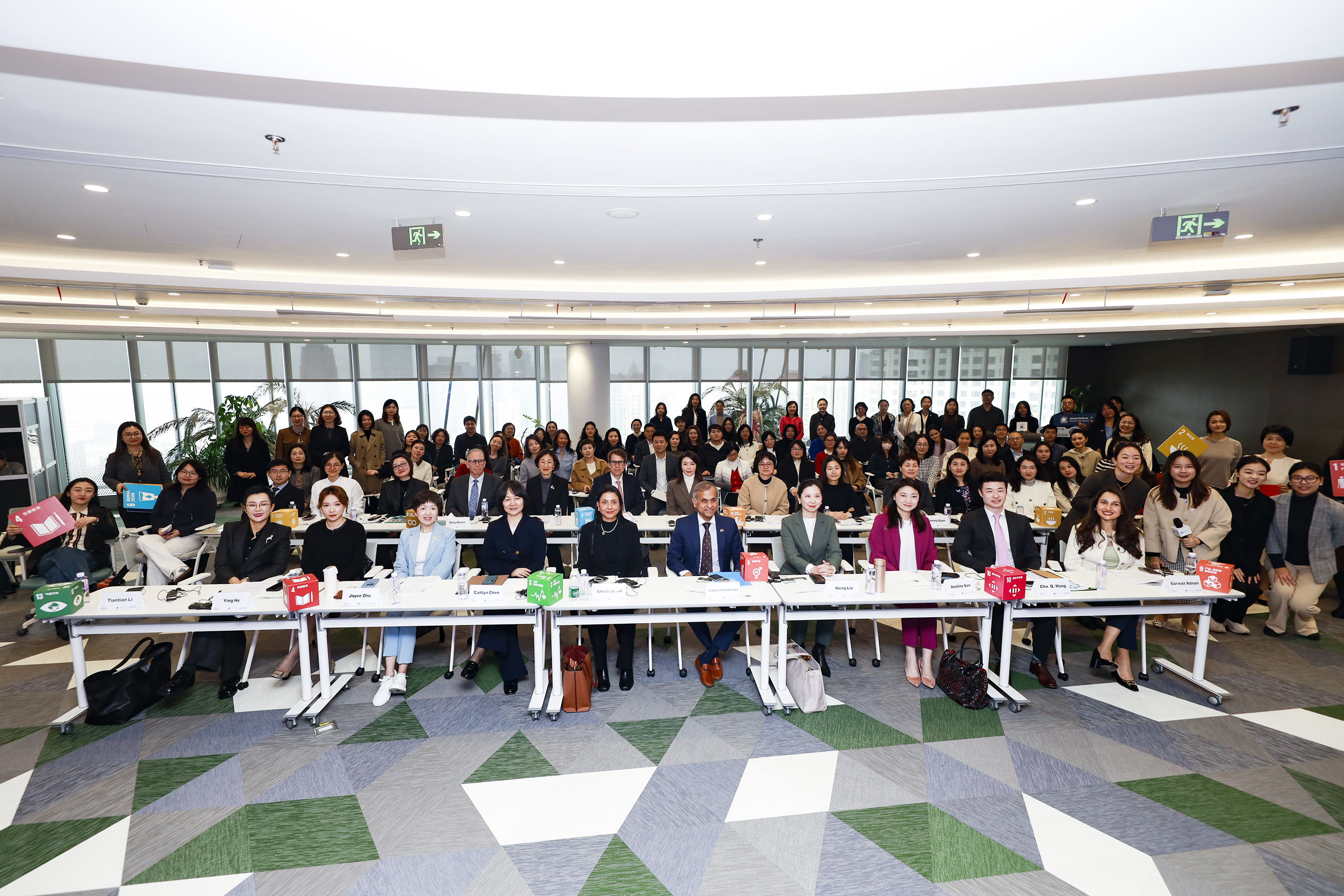China, where women represent over 43 per cent of the workforce but only 10-15 per cent of senior leadership, faces structural challenges in ensuring equal representation.

Across China, gender equality is closely linked to the country’s key megatrends.
- Women influence approximately 75 per cent of household purchasing decisions, making them central to the country’s consumption-driven economy.
- In the silver economy, there are 1.2 times more elderly women over the age of 65 than men, highlighting the need for gender-responsive ageing policies.
- Women also comprise more than 45 per cent of the science and technology workforce, contributing to the country’s digital innovation.
- In the agricultural sector, women represent about 60 per cent of the labour force and are especially vulnerable to the impacts of climate change, underscoring their role in the green transition.
With four major stock exchanges implementing sustainability reporting guidelines, gender equality is increasingly integral to China’s ESG landscape. These shifts highlight the critical role women play in shaping China’s economic and social future and the importance of gender-responsive strategies for sustainable development.
In the lead-up to the 50th anniversary of International Women’s Day and the 30th anniversary of the Beijing Declaration and Platform for Action (Beijing+30), UN Women China and the Global Compact Local Network China co-hosted a CEO Roundtable on 3 March 2025 in Shanghai. The event brought together over 80 senior executives and stakeholders to reaffirm the private sector’s role in advancing gender equality through the WEPs. Among those companies were WEPs signatories, Citi, Accor, Tencent Holdings Limited, Shui On Land, Esquel Group, Electrolux, and Suzano.
The roundtable highlighted key strategies to close this gap, including public commitments to gender equality, clear targets for inclusive policies, mentorship initiatives, and cultivating innovation-driven environments.
Smriti Aryal, UN Women China Country Representative, underscored the urgency for action:
“We have the ability to step up – to use our personal leadership, voice and actions to move us forward and bring transformative change so we are the generation that closes the gender equality gap, once and for all. Progress is possible, but it is not inevitable.”
Wang Ying, CEO of Shui On Land, emphasized how shifting industry priorities highlight women’s strengths:
“Many perceive real estate as a heavy-asset, labour-intensive, and relationship-driven industry where women have fewer advantages. However, as the industry shifts into a more mature phase, skills such as refined aesthetics, innovative thinking, precise service insights, and sustainable community management are becoming the new essential assets—areas where women naturally excel. Ensuring equal opportunities for women and empowering them to leverage their strengths is crucial to the industry’s evolution. In our company, women currently make up 48 per cent of our workforce, hold 51per cent of all management positions, and represent 47per cent of senior leadership roles.”
Huang Kunyuan, Chief HR Officer & Managing Director of Esquel Group, shared industry specific insights for gender equality and women’s empowerment:
“In the textile industry, women make up a significant portion of frontline workers. For example, in our group, women account for around 70% of the workforce. In the past, training a skilled female garment worker in complex processes could take up to a year, with experienced workers being the ones who earned more. However, as our group shifts from a labor-intensive to a knowledge-intensive model, with heavy investments in automation and intelligence, training periods have been reduced to just one or two weeks. This shift provides more opportunities for female employees to develop diverse skills and transition into technical roles.”
Other companies like Suzano, Citi, and Accor reaffirmed their commitment to supporting gender equality through their visions:
“As a leader, part of my role is to ensure that gender equality is not just an aspiration but a tangible, measurable goal within our organization, so not only me but also the other leaders who report to me must also have measurable goals to promote gender equality. Another crucial step is holding ourselves accountable. By linking gender diversity to our SLB (sustainability-linked bonds) targets, we have created a business imperative for increasing female representation in leadership. This ensures that gender equality is not seen as a standalone initiative but as a fundamental part of our long-term sustainability and performance strategy.” - Pablo Machado, President of Suzano Asia
“We believe, strongly, that every woman should have the freedom to pursue her ambitions fully and we deeply value the female perspective in every aspect of our business, from our development to growth. Opportunities for women have come a long way here in China, but not far enough. We must continue to shift mindsets, to push further in our progress, and continue to emphasize the value that women contribute. In Greater China, Accor is hiring some 10,000 people, every year. This presents an enormous opportunity for women – and all people – to start a career where they are welcomed and where their progress is supported.” - Gary Rosen, CEO, Accor Greater China
“As a global company, we celebrate the vibrant cultures and communities of our workforce that enable employees of all backgrounds to feel valued and thrive. Initiatives such as hybrid-work, paternity leave, allyship and inclusive networks underscore our commitment to an inclusive workplace and supporting colleagues and their families through major life stages. True gender equality relies on alliances between men and women, supporting each other in both work and family life. This allyship and partnership extend beyond the home—it shapes corporate culture, enables better decision making, strengthens relationships with likeminded organizations, and drives the long-term sustainable development of organizations.” - Aveline San, Acting Citi Country Officer and Banking Head, China
Speakers emphasized that gender-inclusive business practices are ethical and economically beneficial. Research presented by UN Women revealed that companies with diverse leadership teams are 36 per cent more likely to report higher profitability. Firms with women on their boards also see stronger stock performance and reduced volatility, making a strong business case for WEPs-aligned leadership development.
With over 430 companies operating in China committed to the WEPs, the country ranks among the top five countries globally for WEPs adoption. Leaders from companies like Tencent and Electrolux emphasized the value of cross-sector collaboration to accelerate impact.
Tencent’s Vice President Caitlyn Chen noted: “Tencent leverages internet and artificial intelligence technologies to provide critical health resources for women in remote areas. By digitalizing and automating cervical and breast cancer screening, we have significantly reduced the time required for advanced medical technologies to reach underdeveloped regions, improving the quality and efficiency of healthcare services for women at the grassroots level. Achieving gender equality requires the collective efforts of all sectors of society. We hope more corporate partners will join us in harnessing industry expertise and innovation to drive progress in women's health, education, and economic empowerment.”
“As a global company, we integrate diversity, inclusion, and women’s empowerment into our long-term strategy, ensuring that every employee can grow in a fair and equitable environment. In terms of diversity, we intentionally cultivate a talent pool that includes individuals of different genders, backgrounds, and ages, ensuring more women advance into leadership roles. For inclusion, we implement flexible work arrangements to help employees better balance work and personal life. Regarding women’s empowerment, we not only support women’s career development but also encourage men to take on more family responsibilities to achieve true gender balance. We believe that only by fostering a culture of diversity, equity, and inclusion can we drive continuous innovation and progress in our company.” - Jenny Guan, General Manager of Greater China, Electrolux Group
Originally published on UN Women Asia and the Pacific (in English)

